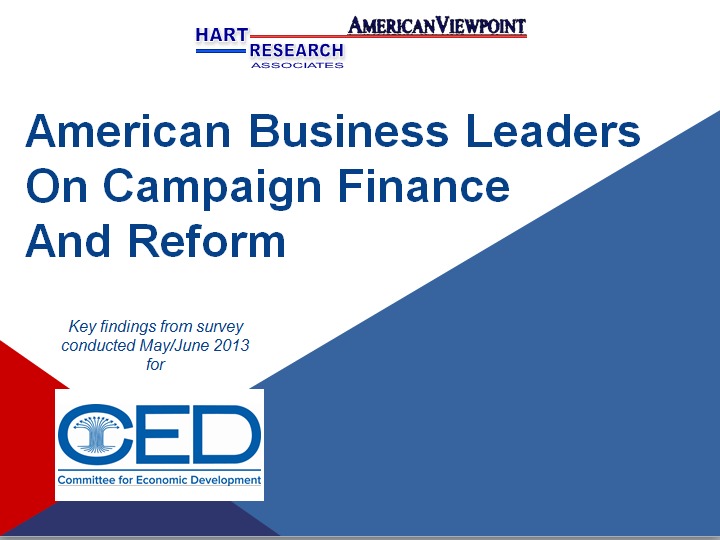Urgently Needed: Reform of the Broken American Political System
This article first appeared on Huffingtonpost.com on July 26, 2013.
The American political system is damaged goods. Public confidence in the U.S. Congress is at an all-time low of just 10 percent, according to a recent Gallup Poll. Then, according to a brand new poll, 85 percent of U.S. business leaders see major problems with the U.S. campaign finance system, indeed 42 percent say the system is completely broken.
The evident concerns about our political system, from the rising roles of cash in elections through to Congressional dysfunction, cry for a response. But, politicians, seemingly trapped in the political quagmire are mostly silent. Unless there is action the situation will only get worse. The new poll of business attitudes, sponsored by the Committee for Economic Development (CED), a respected business think tank, needs to be a wake up call.
There is no shortage of pundits in the U.S. and abroad, that argue that President Obama has failed to live up to the expectations that were so widespread and so high when he was first elected in 2008. Some assert he is not chummy enough with political rivals, others say he is cold and arrogant and unable to communicate well, and still others bemoan that he lacks Lyndon Johnson's arm-twisting skills.
Doubtless there are grains of truth in such assertions, but I doubt if anyone sitting in the White House today could enjoy greater success. The problem is that the American political system, especially that part of which that concerns the election of public office holders, is broken.
Gridlock in Washington, D.C. is a daily newspaper headline, be it about healthcare reform, gun control, immigration laws, the budget, or support for farmers. Corruption is widely seen as the villain. A year ago, a Gallup/USA Today poll found that Americans were more concerned about corruption in government than everything else except job creation.
New Business Survey
Efforts to objectively capture the concerns of American business leaders are significant, because public spokesmen for business, such as the U.S. Chamber of Commerce and the National Association of Manufacturers are highly partisan on these issues. The new poll has been completed by the Democratic Party- leaning Hart Research Associates and the Republican Party-leaning American Viewpoint. They surveyed 302 senior executives across the country and they suggest that typically such surveys can have a margin of error of plus/minus 5.6 percent. The findings are blunt and should be a wake up call for reform.
The new CED-sponsored survey concentrated on the campaign finance system. Business leaders believe the political system is based on "pay-to-play" -- if you do not provide cash to a campaign then do not expect to have access, and perhaps influence, on your candidate should she or he win election. Those surveyed were asked whether they believed politicians cast votes when in office to please special interests rather than voters. No less than 61 percent of the respondents said this is definitely the case and a further 33 percent said this is probably the case. The money in the campaign system is driving politicians and political parties to become more extreme, according to 81 percent of those surveyed. And 71 percent said major contributors have too much influence on politicians.
So what should be done?
Reform Action
First, the politicians need to start talking about the core issue of money and politics. President Obama, who cannot stand for reelection, has nothing to lose now in leading a major effort to educate Americans about the failings of the current system and to propose change. While most politicians decry the daily grind of asking for cash for their campaigns, there is no cohesive leadership in either of the major political parties to promote comprehensive reforms.
Second, boost transparency. The new poll finds that among business executives 95 percent of those saying that they are Democrats believe that all individual, corporate and trade union contributions should be disclosed, while 88 percent of those saying that they are Republicans hold this view. I would go further and argue for total transparency in funding sources for all entities that directly and indirectly are seen as engaging in election politics, which would embrace 'Super Pacs' that currently have ways to promote candidates without being part of the official campaign and can keep some of their funding anonymous.
Third, the business poll found overwhelming support for set limits on the amounts that individuals and organizations can contribute to elections. Today, some individuals of great wealth are spending of tens of millions of dollars in support of candidates and making a mockery of the democratic process.
Finally, I believe that no effort should be spared to educate Americans about the merits of public funding of elections. At the moment there appears to be weak support for this. The business survey found that 52 percent of those polled voice some support for such a course, but only 16 percent felt strongly about this.
Unless there is new leadership on these issues, the situation will get worse and the inability of the U.S. president to promote new legislation will erode further. Indeed, unless reform action is launched in earnest in the near future, the amount of cash in elections will probably rise; the volume of negative ads will probably increase; perceptions that 'pay-to-play' is the norm in national politics will harden; and, Americans confidence in politicians and institutions that uphold their democracy will continue to decline.
